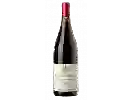
Vignoble Cogné - Domaine de la CouperieCuvée Julien Pinot Noir
This wine generally goes well with pork, poultry or veal.
Food and wine pairings with Cuvée Julien Pinot Noir
Pairings that work perfectly with Cuvée Julien Pinot Noir
Original food and wine pairings with Cuvée Julien Pinot Noir
The Cuvée Julien Pinot Noir of Vignoble Cogné - Domaine de la Couperie matches generally quite well with dishes of veal, pork or game (deer, venison) such as recipes of deer stew, cassoulet or duck leg confit in white wine.
Details and technical informations about Vignoble Cogné - Domaine de la Couperie's Cuvée Julien Pinot Noir.
Discover the grape variety: Pinot noir
Pinot noir is an important red grape variety in Burgundy and Champagne, and its reputation is well known! Great wines such as the Domaine de la Romanée Conti elaborate their wines from this famous grape variety, and make it a great variety. When properly vinified, pinot noit produces red wines of great finesse, with a wide range of aromas depending on its advancement (fruit, undergrowth, leather). it is also the only red grape variety authorized in Alsace. Pinot Noir is not easily cultivated beyond our borders, although it has enjoyed some success in Oregon, the United States, Australia and New Zealand.
Informations about the Vignoble Cogné - Domaine de la Couperie
The Vignoble Cogné - Domaine de la Couperie is one of of the world's greatest estates. It offers 21 wines for sale in the of Loire Valley to come and discover on site or to buy online.
The wine region of Loire Valley
The Loire Valley is a key wine region in western France. It follows the course of the Loire River on its Long journey through the heart of France, from the inland hills of the Auvergne to the plains of the French Atlantic coast near Nantes (Muscadet country). Important in terms of quantity and quality, the region produces large quantities (about 4 million h/l each year) of everyday wines, as well as some of France's greatest wines. Diversity is another of the region's major assets; the styles of wine produced here range from the light, tangy Muscadet to the Sweet, honeyed Bonnezeaux, the Sparkling whites of Vouvray and the juicy, Tannic reds of Chinon and Saumur.
The word of the wine: Acidity
When present without excess, acidity contributes to the balance of the wine, giving it freshness and nervousness. But when it is very high, it becomes a defect, giving it a biting and green character. On the other hand, if it is insufficient, the wine is soft.














